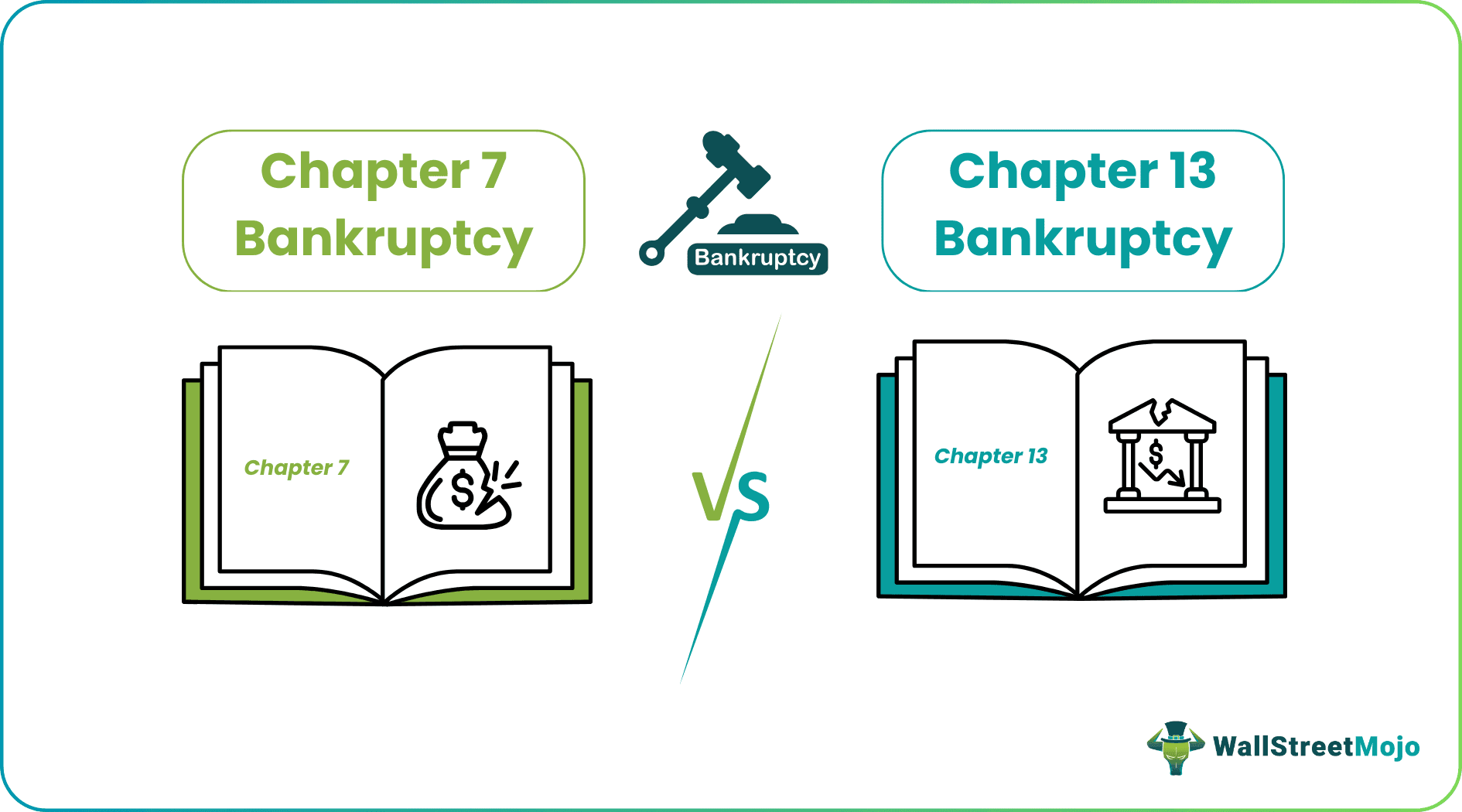Table Of Contents
Difference Between Chapter 7 and Chapter 13
The basic idea of chapter 7 of bankruptcy is that the person needs to surrender its asset to the creditors where a trustee is assigned to manage the property and is required where the person does not own sufficient funds to pay off. On the other hand, chapter 13 of bankruptcy is designed to keep all of your property and debt is discharged either by the restructuring of debt to make it manageable to pay or a waiver of a part of the debt to make the rest manageable to pay.

Most bankruptcies filed in the United States are either Chapter 7 or Chapter 13 bankruptcy cases. Which bankruptcy is the right choice depends on the earned income, assets, debts, and financial goals?
Table of Contents
- Difference Between Chapter 7 and Chapter 13
- Under Chapter 7, Bankruptcy or "Liquidation of Assets," certain consumer assets are liquidated to pay off outstanding debts to creditors. Once filed, this type of bankruptcy is typically discharged approximately three months later with no further payments made by the consumer.
- Chapter 13 bankruptcy can also be termed a debt plan (adjusted) under which the court approves a repayment plan. Under chapter 13 bankruptcy, the consumer must periodically make partial payments to its creditor over several years. Once the repayment plan is complete, the bankruptcy is discharged.
Chapter 7 vs Chapter 13 Bankruptcy Infographics
Let's see top differences between chapter 7 vs chapter 13 bankruptcy.

Key Differences Between Chapter 7 and Chapter 13
- The primary benefit offered by Chapter 7 is near-guaranteed debt relief. On the other hand, the offerings of Chapter 13 are related to benefits on secured debt. For example, Chapter 13 stops foreclosure proceedings so debtors who have fallen behind on their mortgages can catch up over time without the danger of losing their homes.
- Everyone isn’t eligible for Chapter 7 bankruptcy. If the income level goes below a certain extent, the case would be eligible. Chapter 13 bankruptcy is much more complex and takes more time than Chapter 7 bankruptcy found that 29% of bankruptcy is Chapter 13 bankruptcy. In contrast, most bankruptcy cases, i.e., around 71%, are Chapter 7 bankruptcy
- Under Chapter 7 bankruptcy, you can only keep exempt property, which creditors protect under federal law. You must give your non-exempt property to the bankruptcy trustee, who can sell it and distribute the proceeds to your creditors. In Chapter 13 bankruptcy, you don’t have to give up any property. Instead, you repay your debts out of your income. However, that doesn’t mean that you could keep more property if you had filed bankruptcy under Chapter 7.
Chapter 7 vs Chapter 13 Comparative Table
| Basis of comparison | Chapter 7 | Chapter 13 |
|---|---|---|
| Type of Bankruptcy | Liquidation | Reorganization |
| Eligibility Restrictions | Disposable income must be low enough to pass the Chapter 7 Means Test | Cannot have more than $394,7255 of unsecured debt or $1,184,200 of secured debt |
| How Long Does It Take to Receive a Discharge? | Typically 3 to 5 months | Upon completion of all plan payments (Usually 3 to 5 years) |
| What Happens to Property in Bankruptcy? | Debtors can sell all non-exempt property to pay creditors. | Debtors keep all property but must pay unsecured creditors an amount equal to the value of non-exempt assets. |
| Benefits | Allows debtors to quickly discharge most debts and get a fresh start. | Allows debtors to keep their property and catch up on missed mortgage, car, and nondischargeable priority debt payments. |
| Drawbacks | The trustee can sell the nonexempt property. It doesn’t provide any way to get hold of missed payments. | Must make monthly payments to the trustee for 3 to 5 years. May have to pay back a portion of general unsecured debts. |
| How long does bankruptcy remain? | Ten years from the filing date because there is no repayment of any debt. | Seven years from the filing date because a portion of the debt is repaid under the discharge plan. |
| Effect on credit score | Flag for a Chapter 7 bankruptcy stays on there for ten years. | Flag for a Chapter 13 bankruptcy is removed from the debtor’s credit history seven years after filing. |
| The requirement for bankruptcy proceedings to end | The court must have entered a discharge order. | The borrower must have made all payments in accordance with the court-approved plan, after which the court enters the discharge order. |
Final Thoughts
The two main bankruptcy options available for people overrun by consumer debt are Chapter 7 and Chapter 13 bankruptcy. Both are also allotted on repayment amounts that the debtors should pay to their creditors.
Since Chapter 7 has stricter rules for re-filing, people who have filed for bankruptcy were forced to opt for Chapter 13 in the last few years. After receiving a Chapter 7 discharge, debtors are barred from receiving another Chapter 7 bankruptcy for eight years, but they would only have to wait four years to file under Chapter 13. If the debtor’s earlier case gets dismissed, there would be no time limit.
Recommended Articles
This has been a guide to Chapter 7 vs. Chapter 13 Bankruptcy. Here we discuss the top differences with infographics and a comparative table. You may also have a look at the following articles for gaining further knowledge in Corporate Finance –
